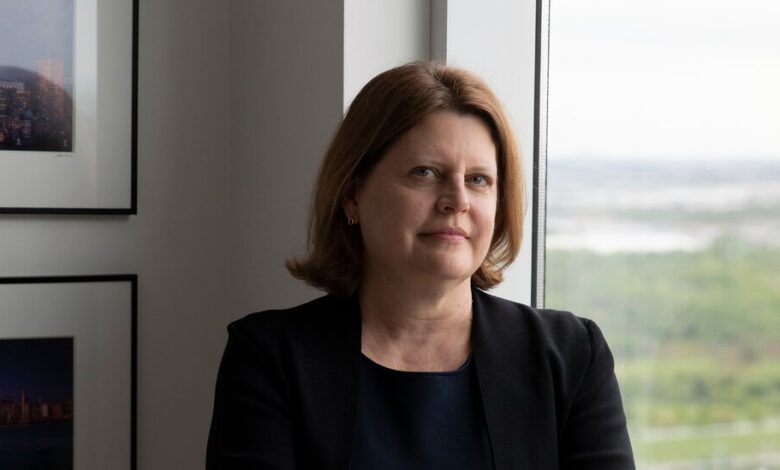Washington Post Newsroom Reacts to Sally Buzbee Exit

On Sunday night, minutes after Will Lewis, the chief executive of The Washington Post, informed employees that the newspaper’s executive editor, Sally Buzbee, was being replaced, managers gathered on a conference call to hear from their boss one last time.
Ms. Buzbee told them that a new organizational structure created by Mr. Lewis — effectively splitting the Washington Post newsroom and opinion section into three smaller divisions — didn’t work for her. She added that Mr. Lewis was pushing for aggressive moves to turn around The Post, and asked editors to reserve judgment for now.
“I would have preferred to stay to help us get through this period, but it just got to the point where it wasn’t possible,” Ms. Buzbee said, according to a person familiar with the matter.
The stunning call — which some attendees described as funereal — added to the growing tension between the newsroom and Mr. Lewis, who has set about remaking The Post since he started in January.
Many reporters and editors figured that Ms. Buzbee would remain in place until at least the presidential election in November. Just two weeks ago, Mr. Lewis and Ms. Buzbee had addressed The Post’s staff together at a long-awaited all-hands meeting.
But Ms. Buzbee chafed at Mr. Lewis’s plans to separate The Post’s newsroom into segments, according to two people familiar with her thinking, and the pair quickly reached an impasse. Mr. Lewis said she could run one of the two the newsroom segments, but she resigned instead, according to a person with knowledge of the interactions.
The reorganization would have been an effective demotion for Ms. Buzbee, who is currently in charge of all news content at The Washington Post. The new structure, which adds a new division focused on service and social media journalism under the supervision of a new editor, would have brought a large portion of The Post’s editorial output out from under her supervision.
Mr. Lewis is temporarily replacing Ms. Buzbee with Matt Murray, the former editor in chief of The Wall Street Journal. Mr. Murray will run The Post’s newsroom as executive editor through the election, at which point he will transition to run the division focused on service and social media journalism.
A new editor, Robert Winnett, will take over the company’s core coverage areas after that. For the past decade, Mr. Winnett has run news operations at The Daily Telegraph and The Sunday Telegraph.
David Shipley will continue to run The Post’s opinion section. All three — Mr. Winnett, Mr. Murray and Mr. Shipley — will report directly to Mr. Lewis.
Mr. Murray, 58, was introduced to The Post’s newsroom on Monday, in a town-hall meeting that kicked off with a long round of applause for Ms. Buzbee, according to several people in attendance. During the meeting, Mr. Lewis was grilled by reporters at The Post on the lack of diversity in the hires replacing Ms. Buzbee — Mr. Murray, Mr. Winnett and Mr. Shipley are white men.
According to a recording obtained by The New York Times, one of The Washington Post’s star political reporters, Ashley Parker, asked Mr. Lewis how the newspaper had arrived at its decision, adding that one skeptical interpretation might be that Mr. Lewis was simply hiring his associates to help run The Post.
“When you were here before, you talked very movingly about how you care about diversity — and people talk about diversity — but then when push comes to shove, they say, ‘Well, I looked around and I couldn’t find anyone,’” Ms. Parker said.
In response, Mr. Lewis said that diversity would be a “constant commitment” at The Post, adding that he had “the most diverse masthead that The Journal had ever had” during his years at Dow Jones, the publisher of The Journal.
Mr. Murray is a longtime confidant of Mr. Lewis, who appointed him to the top position of The Wall Street Journal in 2018. Mr. Murray served in a wide variety of editorial roles over more than two decades at The Journal, and steered the newspaper through the coronavirus pandemic.
The editorial change-up comes at a delicate time for The Washington Post. The newspaper is preparing to cover the homestretch of the presidential election, including the nominating conventions in Chicago and Milwaukee this summer. It is highly unusual to replace the top editor of a major U.S. newspaper during this period.
At the town hall meeting two weeks ago, Mr. Lewis rattled off a list of priorities that included “build it,” “fix it” and “say it.” Mr. Lewis revealed that The Post was in dire straits, with more than $70 million in losses over the last year and audience declines of 50 percent over the same period.



